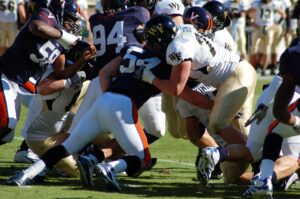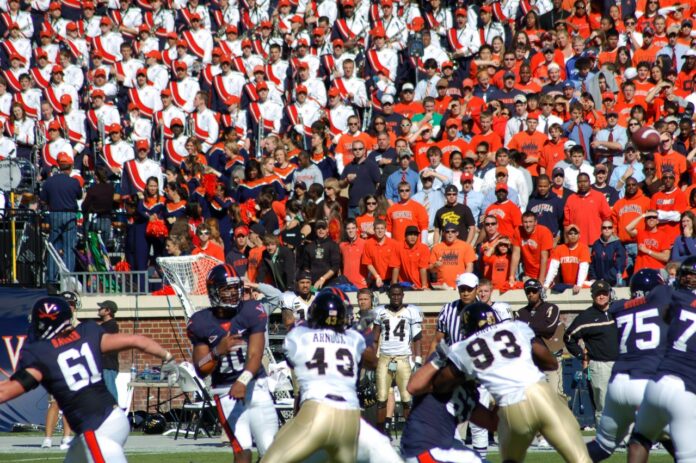Songwriter Billy Preston would be proud.
His 1972 hit, “Will It Go Round in Circles,” could easily fit as the current theme song for NCAA college football.
Translated, if you say something or someone is going round in circles it means they are not achieving anything because they keep coming back to the same point or problem.
College football was in virtual disarray by week’s end as individual teams and Power-5 Conferences went in every direction on whether a fall football season would be played. At the same time. many players were opting out of playing in 2020, others were rallying like a worker’s labor union to play the season, and questions on safety guidelines, fan attendance and starting dates were up in the air.
Another chapter in the ongoing COVID-19 pandemic crisis that has continued to disrupt the sports world since March.
Things got started last Saturday when the first FBS conference to pull the plug on a fall season was the Mid-American. The Mountain West followed suit on Monday. On Tuesday, FBS independent UMass postponed its football season to the spring, following the same plan of members Connecticut and Old Dominion.
By midday Monday reports starting circulating that the Big-10, which had already changed its scheduling to conference-only opponents a week earlier, thus eliminating among others, a scheduled game during week-2 in Blacksburg against Virginia Tech, was going to cancel football entirely for 2020. The Penn State game in Blacksburg was set to be the first meeting on the gridiron between the two schools, and a huge bonanza for the coffers of the Hokies with the expected sellout at Lane Stadium.
By Monday afternoon, one high-ranking source in the Big-10 told a Michigan newspaper, “It’s done” referring to the cancellation of all Big-10 games.
BIg-10 coaches including Michigan’s Jim Harbaugh, Ohio State’s Ryan Day and Nebraska’s Scott Frost were still lobbying to play.
“Swinging as hard as we possibly can right now for these players!! This isn’t over!,” Day tweeted.
It may not be over until the fat lady sings, but in the case of the Big-10 the fat lady was waiting in the wings.
The final vote in the Big-10 to cancel was 12-2. Leading the way was the president of Michigan State University, Samuel Stanley (immunology and infectious diseases) and University of Michigan president Mark Schlissel (immunology and internal medicine), both medical doctors in the aforementioned fields. The announce was made Tuesday and one hour later the Pac-12 Conference followed suit, pausing all sports until January 1st, with hopes to play football next spring.
“This was an extremely difficult and painful decision that we know will have important impacts on our student-athletes, coaches, administrators and our fans, Pac-12 commissioner Larry Scott said.

Michigan State linebacker Marcel Lewis, who opted out playing on Saturday, said he lost a family member to the virus and doesn’t want to risk playing. Indiana offensive lineman Brady Feeney, who is suffering from COVID-19-related heart issues urged schools and players to “listen to our medical experts.” Feeney’s mother implored the college football world to take the virus seriously.
Dr. Amesh Adalja, a senior scholar at the Johns Hopkins University Center of Health Security and one of the members of the group advising the NCAA on COVID-19, told the Detroit Free Press on Saturday a college football season no longer appeared feasible.
“When we were trying to think about ways to make it safe, we were at a time when there was kind of more control of the virus, and you’ve got less control of the virus now than we had several months earlier during when the stay at home orders were just starting to be lifted,” Adalja said. “And, then the other thing that’s made it what made it much more difficult is football is a contact sport, which is going to require some amount of testing of players. The turnaround times for outpatient testing are really unacceptable for being able to safely clear somebody to play.”
The cancellation of the Big-10 and Pac-12 left the SEC, Big-12 and ACC as the remaining Power-5 conferences left to make a decision. All three began to move forward to play this fall. Sports Illustrated reported Tuesday that the ACC and SEC would wait until the Big-12 made a decision and follow suit.
The ACC issued a statement. “The safety of our students, staff and overall campus communities will always be our top priority, and we are pleased with the protocols administrated by our 15 campuses. We will continue to follow our process that has been in place for months and has served us well. We understand the need to stay flexible and be prepared to adjust as medical information and the landscape evolves.”
The Big-12 also indicated it could change course if the data around COVID-19 took a turn for the worse.
On Thursday, the Southern Conference, including VMI, cancelled its fall football season. VMI had the option to still play its non-conference game at UVA on September 11, but decided not to exercise that option even though it would have received $375,000 for playing the Hoos.
VMI athletic director Dave Diles was straightforward with the decision to pass on the UVA game.
“It’s never been about revenue,” Diles noted. “It’s been about the execution of a program in the context of the health, safety and welfare of the cadet athlete.”
Southern Conference Commissioner Jim Schaus added the group’s perspective in a statement.
“This decision was made with extensive evaluation and conversation,” Schaus said. “Ultimately, we felt it necessary to ensure the health and safety of student-athletes, coaches and staff. This decision was also supported by the conference’s medical advisory committee. I am greatly saddened to not be able to conduct our fall conference competition. We know what this means to our student-athletes, coaches, staff and loyal fans, bur safety must come first.”
The Ohio Valley Conference joined the Southern Conference on Thursday in deciding to move its fall sports to the spring, meaning all 13 FCS conferences have now postponed fall sports for 2020. NCAA Division II and III football had already been cancelled for the fall.
So, the final three Power-5 conferences are still on path to play by September. Do they know something everyone else is missing? Can they control outbreaks in a high contact sport? Can they control social distancing in huge stadiums that can seat as many as 100,000 fans? Can proper testing of players be completed in a timely, weekly fashion? And, what happens if positive testing develops as far as eligibility of players and future games?
What rules? The safety of everyone or the lure of the almighty dollar for athletic department budgets? Or can the two be balanced?
Stay tuned.
Bill Turner


